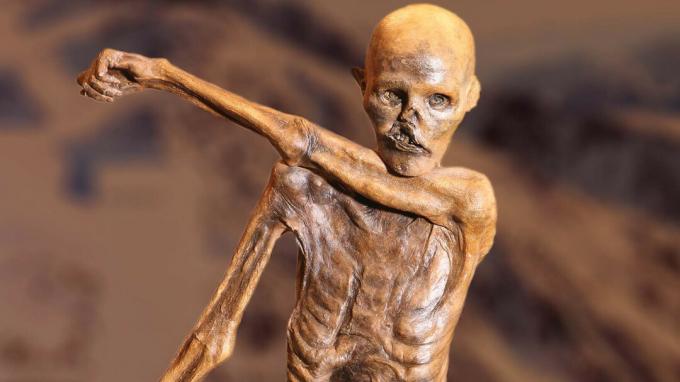If it were possible to go back time, we would certainly cross paths with Ötzi, aka the "Ice Man", an individual who lived about 5,300 years ago on the slopes of the Venoste Alps, between Austria and Italy.
Thanks to advances in genetic research, today we can see more clearly who he was, what he looked like and even some peculiarities of his health.
see more
Believe it or not: for centuries, the Vatican classified the capybara…
From China to Egypt: discover the LARGEST pyramids in the world
The enigma of Ötzi, whose body was discovered in 1991 after glaciers melted, continues to captivate us with its fascinating story.
New details revealed by genetics
A recent study published in the journal Cell Genomics has shed new light on Ötzi's appearance and his ancestral origins.
Through genome sequencing, scientists were able to determine that he had brown eyes, black hair, and a darker skin tone than previously believed.
Such characteristics differ from traditional representations of Europeans with fair skin and blond hair.
(Image: Cell Genomics – We Wang/Reproduction)
Genetic analysis also provided surprising insights into the roots ancestors by Ötzi.
Its ancestry can be traced back to the first farmers in Anatolia, a region in what is now Turkey, who migrated to Europe around 9,000 years ago. Such a discovery sheds new light on the diversity and origins of ancient peoples.
Male pattern baldness: an age-old problem
One of the most intriguing findings of the research is that Ötzi had a genetic predisposition to male pattern baldness, a trait that seems to have accompanied men for millennia.
This revelation brings humanity of the “Iceman” with a feature previously considered exclusive to the modern world. Such information sheds light on the universal nature of certain genetic traits.
(Image: South Tyrol Archeology Museum/Reproduction)

(Image: publicity)
DNA analysis also indicated health predispositions in Ötzi, such as cardiovascular disease, type 2 diabetes and obesity.
However, what is even more fascinating is how he managed to overcome these genetic predispositions in a context where medical resources and knowledge were limited.
His active lifestyle and diet seem to have played a crucial role in managing his health.
Connections with the past
While we've unlocked many aspects of Ötzi, there are still mysteries to be explored. His story is a reminder that he lived surrounded by other people, each with their own experiences.
Researchers continue to collect genetic data from other individuals in the region, seeking to better understand the context in which Ötzi lived and how he fits into human history.
Ötzi's physical characteristics, ancestral origins and health remind us of our deep connection with our ancestors.
While living in a distant era, genetic similarities and shared narratives transcend time, reinforcing that Ötzi's story is indeed a window into our own journey. evolutionary.
